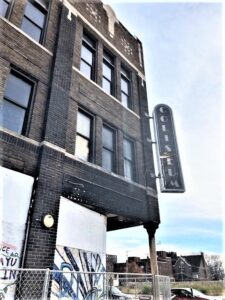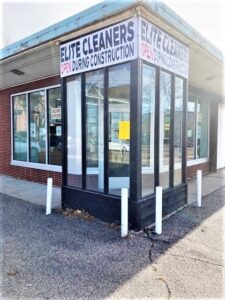BY KAY SCHROVEN
A year or two from now, can you picture yourself waltzing into the Longfellow neighborhood’s Coliseum Building at 2700 E. Lake St. for a cocktail, to shop for goods and services, secure a job, or view an art exhibit? Taylor Smrikárova, project manager for Redesign, Inc. (aka Seward Redesign) can. “The Coliseum has good bones, it just needs help,” she says.
Smrikárova, who has a background in architecture and real estate, envisions an open, welcoming lobby, a rooftop space, as well as a varied and diverse renter population. She is excited and hopeful about the redevelopment of East Lake Street following the 2020 civil unrest when 150 buildings were set on fire and dozens burned to the ground after the murder of George Floyd.
The Coliseum has had multiple lives: It was built in 1917 and opened as Freeman’s Department Store, successfully operated as a family business until the 1940s when it was sold to the May Department Stores Company based in St. Louis. This sale did not work out and by 1956 the property fell back to the Freemans. In 1975, Freeman sold to Roger Podany, who sold used office furniture and renamed the building for himself. While Podany did not invest much in the property, he preserved the ballroom on the third floor and rented it to rock bands, including The Suburbs, for practice space. When Podany sought to sell to a known slumlord, the Longfellow Community Council (LCC) stepped up and searched for a community-based developer. Enter Fred Lehman. Lehman forged a partnership with a wealthy physician who eventually pulled out of the deal. The LCC came to the rescue in conjunction with the Neighborhood Revitalization Program (NRP). This, along with bank and additional city and neighborhood funds, allowed Lehman to purchase and rehab the property. In 2001 the building reopened with tenants such as Denny’s Restaurant, a Latino health clinic and the 3rd Precinct police station in the basement. The 3rd Precinct moved after a torrential rain flooded the basement. An out-of-town financial group then bought the building and managed it until 2020 when civil unrest upended the building. Enter Chris Romano, executive director of Seward Redesign.
Redesign is a nonprofit community developer with 50 years of experience in the Seward and Longfellow neighborhoods. It is also one of 16 nonprofits that received access to an acquisition loan program called CAT (Community Asset Transition) created by LISC (Local Initiatives Support Corporation) in partnership with Hennepin County, JPMorgan Chase, and the Minneapolis, Bush, and McKnight Foundations, to assist with the recovery from the riots and the ongoing pandemic. Redesign and its partners are also seeking funds from We Love Lake Street grants, PACE Equity, New Markets Tax Credits, tax increment financing, historic tax credits, the Minneapolis Commercial Property Development Fund and Xcel Energy rebates.
 Redesign also purchased the Elite Cleaners property at 3101 Minnehaha Ave. Smrikárova and others have a vision of what these properties can be, and well-laid plans. Smrikárova describes not just a restoration of buildings, but a “resurgence and revitalization” much like H Street in Washington, D.C., where the 1968 riots following the assassination of Dr. Martin Luther King Jr. burned the neighborhood to the ground. Following that event, businesses faced disinvestment (in the 1970s and ‘80s) and ultimately fled to the suburbs until the early 2000s, when a renewed interest in city living and a resurgence took place making it the vital destination it is today, known for its nightlife, festivals, restaurants, pop-ups and communal atmosphere. “We do not want this iconic building to sit empty for long. Bringing the Coliseum back online is part of the healing process happening across Lake Street,” Smrikárova said.
Redesign also purchased the Elite Cleaners property at 3101 Minnehaha Ave. Smrikárova and others have a vision of what these properties can be, and well-laid plans. Smrikárova describes not just a restoration of buildings, but a “resurgence and revitalization” much like H Street in Washington, D.C., where the 1968 riots following the assassination of Dr. Martin Luther King Jr. burned the neighborhood to the ground. Following that event, businesses faced disinvestment (in the 1970s and ‘80s) and ultimately fled to the suburbs until the early 2000s, when a renewed interest in city living and a resurgence took place making it the vital destination it is today, known for its nightlife, festivals, restaurants, pop-ups and communal atmosphere. “We do not want this iconic building to sit empty for long. Bringing the Coliseum back online is part of the healing process happening across Lake Street,” Smrikárova said.
Smrikárova and Redesign are energized by the challenge and enjoy working with other organizations, coalitions and individuals who share their vision. “This time it will be different.” This time it will be an organic process “not happening to the community but being of the community,” Smrikárova said. This time, plans are being built on cultural assets, equity and transparency. There will be coalitions, community involvement and investment with a focus on opportunities for business and talent in the Black, Indigenous and People of Color (BIPOC) communities. That is, entrée for people who may have been shut out in the past for a variety of reasons, including financial ones. The goal is community ownership and wealth building, especially for those who have been shut out due to prejudicial lending practices and systemic racism.
The Coliseum will welcome diverse entrepreneurs. Former tenants, as well as new ones, will be invited in and offered affordable leases. Already three anchors have been established who will co-own and operate the 70,000-square-foot building – a new bar, restaurant and event space from the owners of Du Nord Social Spirits; Urban Design Perspectives, a Black woman-owned architecture firm; and Commonsense Consulting@Work, a Black woman-owned consulting firm. Redesign is also in the process of registering the Coliseum with the National Register of Historic Places. The first step of making the application has been completed. Step two is in process and involves design approval. If approved, this status allows for state and federal tax credits.
Peter McLaughlin, former Hennepin County commissioner and Minnesota state representative, has been the executive director of LISC since 2019. LISC is dedicated to supporting projects to revitalize communities and bring greater economic opportunities to residents. This is done through capital, strategy and know-how. LISC is funded by foundations, businesses and governments. With respect to East Lake Street, McLaughlin said the goal is to “gain local control of damaged properties” rather than allow outside investors to come in who would not have an understanding of, or commitment to, the community. This is done using financial lending to community members, particularly BIPOC members seeking to become stakeholders. “It’s not just about financing, it’s about place-making,” McLaughlin said, which may be described as preserving and nourishing the soul of the community. Now that the Coliseum building has been secured, LISC is raising funds for the renovation, which is estimated at $16 million. Construction is expected to take a year and will be done by two local community-oriented companies, minority-owned TRI-Construction and Watson-Forsberg, with a goal of opening the summer of 2023.
Redesign is also buying the Elite Cleaners property just south of Lake Street and Minnehaha Avenue, thanks to an $827,250 loan from LISC. The property was heavily damaged during the same civil unrest and now sits amongst other vacant buildings including the former post office, the Odd Fellows building and the Coliseum. Within a day of the destruction, the Lake Street Council was on site to help secure the building and a disaster grant, but Samir and Pinky Patel, who own the cleaning business, could not afford to rebuild without assistance. A $1.1 million renovation/expansion began in November 2021, a small fraction of the estimated $350 million in commercial destruction wrought in the riots. Redesign will eventually sell the dry-cleaning property to the Patels for approximately $475,000. Redesign will also retain an adjacent piece of land with the intention of developing what’s known as “missing middle housing.”
When Samir and Pinky Patel contacted the Lake Street Council for assistance they were referred to Nancy St. Germaine. St. Germaine, a member of the Turtle Mountain Ojibwa of North Dakota, has a college background but said, “that has little to nothing to do with what I do today. I learn by doing and started by laying tile in bathrooms throughout college.” Today she is the owner of six-year-old Raven Construction and Jack’s Hardware on Franklin Avenue (the former Welna II Hardware store). With the assistance of the Community Property Development Fund (CPDF), Raven was able to secure a 40-year, forgivable loan with 0% interest. Raven Construction has joined Elite in the reconstruction plans and will relocate warehousing and offices into the back of the Elite property. St. Germaine, along with her team of 10, is working with the Patels on the redesign, expansion and construction of the Minnehaha Avenue property.
Ironically, the hollowing out via riots of neighborhoods with many immigrant-owned businesses has created opportunities for minority-owned businesses as rebuilding takes place. Raven has been growing rapidly, often through networking and community engagement, and has plans to branch into the mechanical and electrical areas. Unlike large projects with one owner, this type of reconstruction involves hundreds of small business owners with their own goals. Smaller, minority-owned construction firms often have difficulty obtaining bank loans; barriers still exist, access to capital is still a challenge, and competition, especially with large construction companies, is tough. Only 2.8% of state procurement in the construction field goes to minority-owned businesses and just .02% to Black-owned businesses. As St. Germaine said, “This is why we need cooperatives, partnerships and shared services.” She is also in the process of developing an internship/mentoring program to give BIPOC and women a fresh start – an opportunity to learn the skills and business of construction.
In the meantime, as construction gets underway, watch for art projects in and around the Coliseum, designed to alert us to the coming changes and inspire us toward a better day. Redesign is working closely with fivexfive Public Art Consultants. Robyne Robinson is the principal of fivexfive, whom you may remember from her career as a TV journalist. fivexfivewill engage local BIPOC artists to create a tangible invitation for the community and a message of hope regarding what’s to come.






















